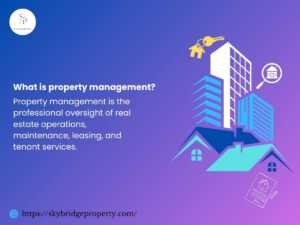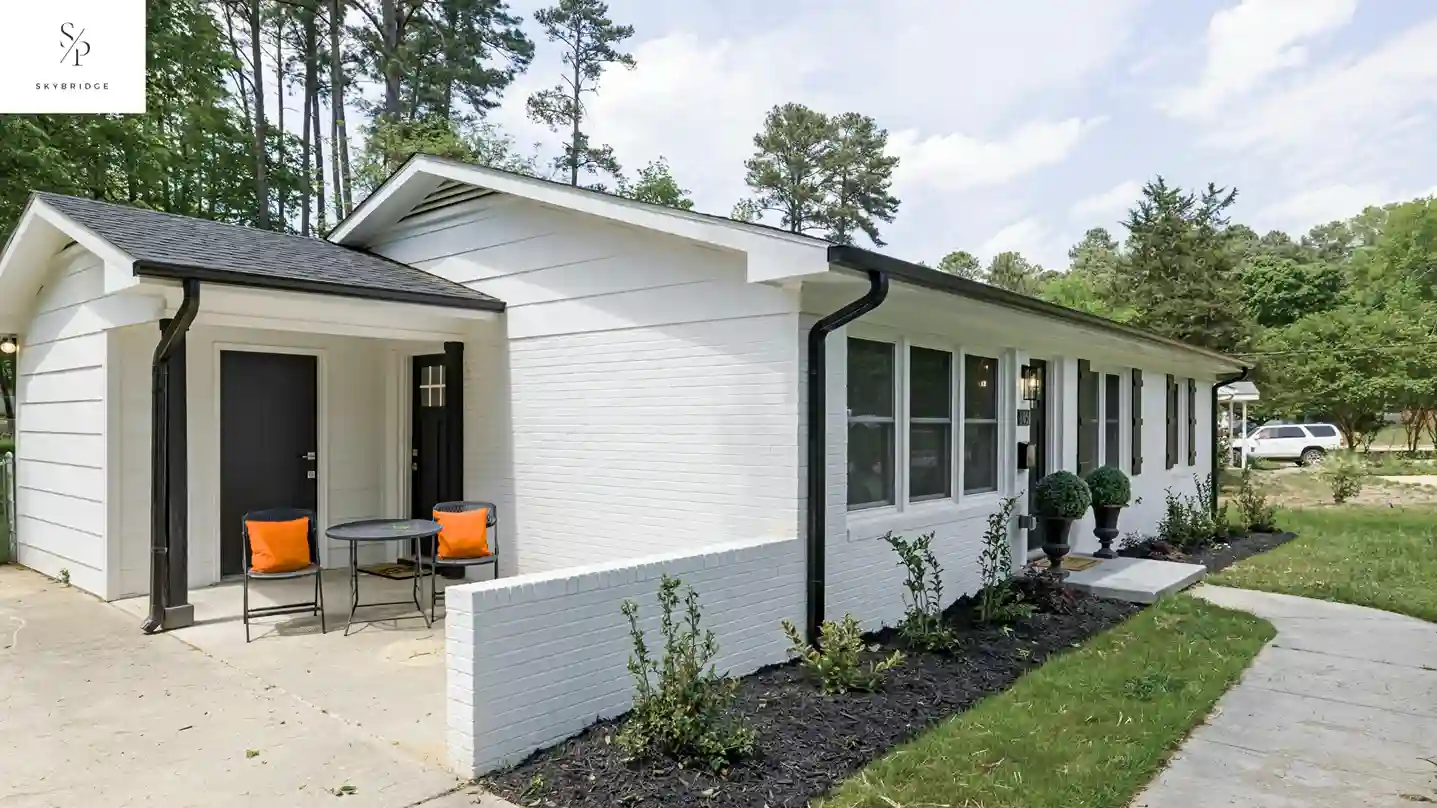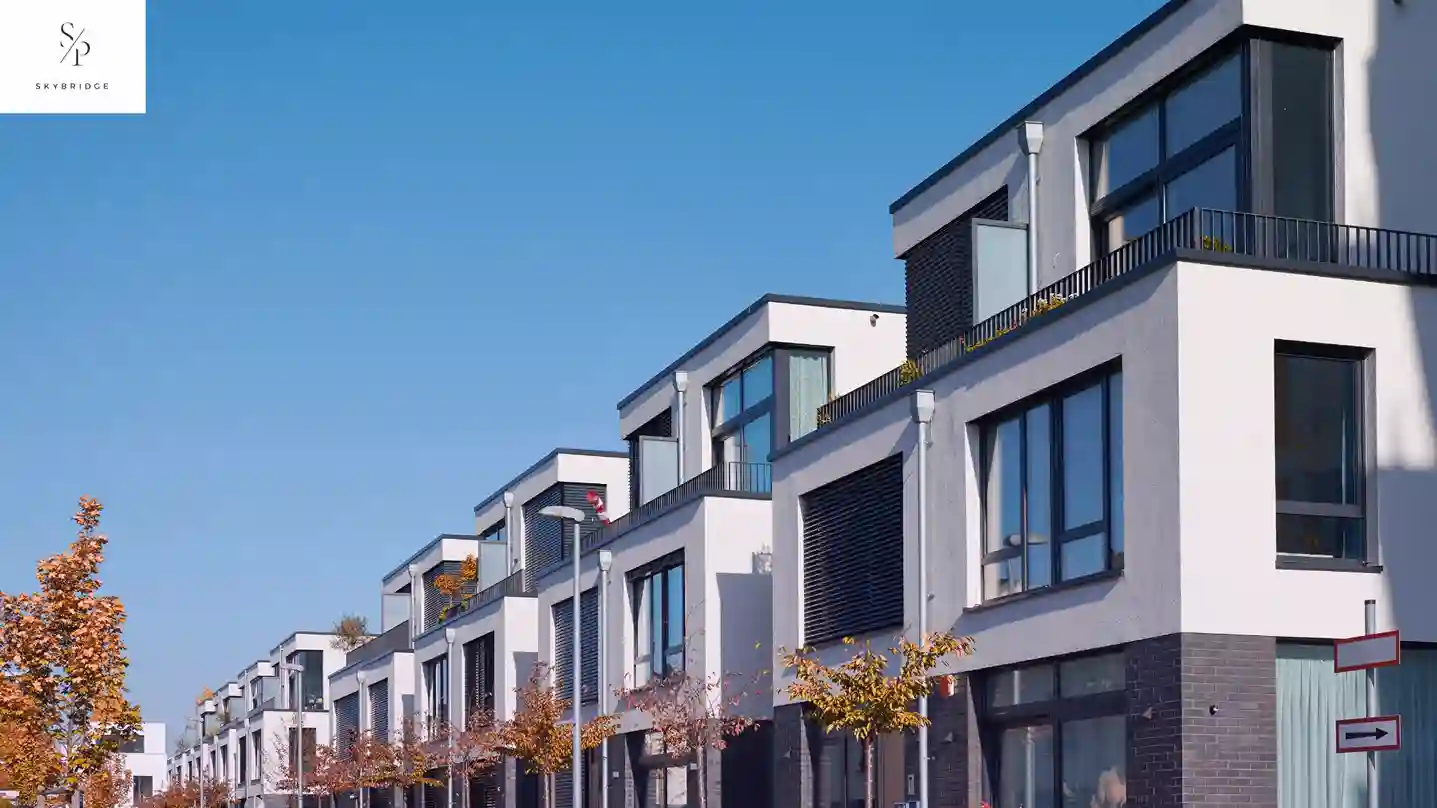
Trusted property management company in SoCal, delivering stress-free rental solutions that increase your ROI.
Call (909) 610-9780 for hands-off California property management from the trusted and reliable property manager, Skybridge Property Group, a licensed California real estate firm serving both property owners and renters throughout Southern California and statewide. Whether it’s setting competitive rent prices, placing qualified tenants, enforcing lease agreements, or improving ROI through strategic operations, our team delivers end-to-end rental property management across California, backed by over 14 years of market experience and full legal compliance with state housing laws.
Skybridge Property Group manages single-family homes, duplexes, condos, townhomes, luxury estates, and HOA communities across California. We offer a range of services, including property marketing, tenant screening, rent collection, maintenance, financial reporting, and eviction handling, all designed to protect your investment and maximize returns. Property owners benefit from efficient management, reduced vacancy, and higher rental income. For tenants, we provide well-maintained homes, timely repairs, and clear lease terms, along with easy access to online portals for rent payments and service requests, ensuring a seamless rental experience from move-in to renewal.
Tired of late-night maintenance calls and unreliable tenants? Let Skybridge Property Group take over the day-to-day, so you can focus on growing your investment. Our California property management services are designed to save time, reduce stress, and deliver long-term value for owners while providing dependable housing experiences for renters. Contact us today to request a custom management plan tailored to your property type, location, and rental goals.
Schedule Your Free Consultation
Due to an overwhelming number of inquiries, we are not currently accepting vendor solicitations or partnership proposals.
Thank you for your understanding, we truly appreciate your interest but must prioritize our property owners.
✅ If you're a property owner, please proceed with the form below.
Property Owner Consultation Request. Schedule your free consultation, tailored for property owners only.



Skybridge Property Group is a licensed California property management company, registered with the California Bureau of Real Estate (DRE #01962702), with over a decade of experience managing residential rental properties across the state since 2011. Headquartered in Los Angeles, our company specializes in full-service property management for single-family homes, multi-unit buildings, luxury residences, condominiums, and HOA communities across Southern California. With a strong emphasis on legal compliance, operational efficiency, and personalized support, we help property owners safeguard their investments while delivering stable, high-quality housing to tenants in Los Angeles, Riverside, Orange County, and surrounding areas.
Skybridge Property Group offers property management in SoCal that prioritizes both owner returns and tenant satisfaction. Our service model combines local expertise, regulatory knowledge, and operational efficiency to protect investments and maintain high-quality rental homes. Here’s why both property owners and residents trust us:
Whether you are a Southern California property owner aiming to stabilize returns or a tenant looking for well-managed housing, our commitment to compliance, service, and communication makes us the trusted partner in rental property success.
We are local, understand California’s landscape, and have experience in getting maximum ROI from your real estate property. We are here to help and grow together. Contact us now.
Skybridge Property Group addresses common challenges faced by both property owners and tenants in the SoCal rental market. We apply localized solutions to support stability, income consistency, legal compliance, and overall rental satisfaction.
Many property owners struggle to find qualified tenants, particularly for high-value homes in areas like The Country or Summit Ridge. We address this by conducting thorough credit evaluations, background checks, rental history analysis, and income verification. One SoCal landlord reported a 95 percent drop in late payments and avoided more than $3,000 in property damage after switching to our screening process.
Inconsistent rent collection is a common issue for owners who manage their properties directly. We use secure online payment systems, send timely reminders, and apply structured late fee policies to reduce delays. A property owner using our rent collection service increased cash flow by 20 percent and saw an 80 percent reduction in missed payments within the first three months.
Surprise repair expenses can reduce net returns and affect property value. We perform routine inspections, use licensed vendors familiar with California property codes, and plan preventive maintenance based on seasonal risk. One client saved more than $5,000 annually by transitioning to our proactive maintenance approach.
Tenants often report frustration when maintenance issues are not resolved quickly. We allow online service requests 24 hours a day, track response time internally, and use reliable vendors to complete work without delay. This ensures safe, functional living spaces and fewer repeated problems.
Poor follow-up from landlords can create stress for renters. Our system provides regular status updates on maintenance, policy notices, and document access through the tenant portal. This helps residents stay informed and builds trust throughout the lease period.
Ashish Kanyal
“Customers rated this pro highly for professionalism, work quality, and responsiveness. Exceptional.”
Mike McNeal
“Skybridge Property Group Is a 5 star property management team. They are quick to respond if there is any help you need. They are very friendly and easy to work with.”
Moe A.
“Faraaz was great to work with. He did an impressive job marketing and finding a tenant for our home. In less than two weeks a lease was signed. I quickly learned Faraaz is well worth the agent fee and I will not hesitate to have him list my next property. Thank you Faraaz for all your hard work! A+”
Saeid Shantiyai
“Very responsive to matters of maintenance in the building.”
Eunice Nam
“They are so helpful! We appreciate all that they did for us.”
Heidi B.
“Knowledgeable, fair and honest folks. Always thoughtful of the clients needs. Very pleased.”
Serena T.
“Can’t say enough amazing things about them! Faraaz has been nothing but helpful and incredibly gracious in the entire process. I couldn’t have asked for a better person to help me with renting. He is incredibly honest, concise, and is very quick to getting back to me with any questions and concerns. You can tell Skybridge truly cares about people more, which is more than I can say about most businesses. ;)”
Sam V.
“Thank you Faraaz Hashmi for working so hard and exceeding my expectations. Feel so fortunate to have gotten a chance to have such an amazing hard working individual who goes above and beyond for his clients !!!!”
Joseph R.
“Great management company. Whenever you need them you can always call and expect a quick response. They’re also very communicative and welcoming when they started managing over our property.”
Reem K.
“Contacted SkyBridge since they came highly recommended and I was not disappointed. Faraaz Hashmi helped us rent our investment property in the states and we were very pleased with the service. He proved to be a thorough professional from our initial call and we could not be happier with the outcome. Thank you Faraaz!”
Skybridge Property Group helps California property owners by handling every aspect of rental management, from leasing and tenant screening to maintenance, legal compliance, and financial oversight. Our services are designed to protect your property, stabilize your income, and minimize the time and stress associated with being a landlord.

Skybridge Property Group promotes California rental properties across leading online platforms using professional photography, data-backed pricing, and compelling listing descriptions tailored to tenant demand. Homes located near schools, transit hubs, or within gated communities are positioned strategically to reach qualified renters browsing in competitive Southern California submarkets. This approach helps property owners minimize vacancy and secure tenants faster, while applicants benefit from clear property listings, mobile-friendly application access, and timely responses throughout the inquiry process.

Finding dependable tenants is one of the most critical steps in protecting your rental income. Our screening process combines credit evaluation, income verification, rental history analysis, and comprehensive background checks to assess each applicant thoroughly. In compliance with California fair housing laws, Skybridge Property Group applies consistent qualification standards that help property owners avoid costly evictions and long vacancies. Tenants benefit from a fair, respectful process and clear communication throughout the application review.

Skybridge Property Group ensures that rent collection is consistent, secure, and fully trackable. Tenants can pay online through a user-friendly portal that supports scheduled payments, automated reminders, and multiple payment methods. For owners, Skybridge provides detailed monthly income reports, including rent received, outstanding balances, and year-to-date earnings. This combination of digital convenience and financial transparency helps property owners stay informed while reducing late payments and administrative headaches.

Regular maintenance is crucial to preserving your property’s value and tenant satisfaction. Skybridge Property Group coordinates all maintenance tasks through a network of trusted, licensed professionals to ensure timely and high-quality repairs. Tenants can easily submit service requests via our online portal, and property owners are kept informed with progress updates and approval requests for larger projects. This seamless process minimizes property issues, supports California’s habitability standards, and helps maintain long-term tenant retention.

Effective financial management is key to maximizing returns and staying compliant with California’s tax laws. Skybridge Property Group provides clear, detailed accounting services, offering owners monthly income statements, expense reports, and year-end summaries for tax filing. All financial records are securely accessible through an owner portal and updated in real-time, ensuring transparency and easy tracking of property performance. This organized approach allows property owners to stay informed, make informed decisions, and focus on growing their investments without the burden of administrative tasks.

In cases of lease violations or non-payment of rent, Skybridge Property Group manages the entire eviction process, ensuring compliance with California's “just cause” eviction laws, including amendments under SB 567. We handle everything from issuing notices to coordinating court proceedings and final enforcement, following Civil Code §§ 1946.2 and 1947.12. These laws include extended tenant response periods and enhanced documentation for no-fault evictions, ensuring legal compliance. Property owners receive full support, including detailed documentation and legal representation, while tenants are provided clear procedural information and the opportunity to respond within the required timelines, ensuring a fair and transparent process.

With our results guarantee you don’t pay us until we show results! If we are leasing your property for you, we do all the work up front and you don’t pay us until you get a qualified tenant. That means we aggressively market and show your property, screen the tenants, handle all of the paperwork and perform a move-in inspection, all before we get paid anything.
Skybridge Property Group provides professional property management services for a wide range of residential properties across Southern California, including luxury estates, condominiums, single-family homes, multi-family buildings, and HOA-governed communities. Our services are tailored to meet the specific needs of each property type, ensuring efficient management and strong returns for property owners.

Skybridge Property Group specializes in managing high-end residential properties, including larger estates and upscale rentals throughout Southern California. We provide customized marketing, thorough tenant screening, and careful property management to meet the expectations of both owners and tenants. Tenants leasing luxury homes receive exceptional service, while owners benefit from asset protection and premium rental performance.

Managing condominiums across Southern California requires specialized attention to both individual units and shared spaces. Skybridge Property Group offers tailored services that address the unique needs of condo owners and residents. We ensure compliance with HOA rules, manage common area maintenance, and maintain strong communication with the association. Additionally, our team provides targeted marketing and thorough tenant screening to secure reliable renters. With Skybridge handling the management, owners benefit from efficient operations, long-term value retention, and hassle-free service, while tenants enjoy a well-maintained and compliant living space.

Managing a Homeowners' Association requires a balance of leadership, organization, and compliance. Skybridge Property Group provides comprehensive HOA management, helping boards navigate financial planning, rule enforcement, and community maintenance. We assist in organizing meetings, managing budgets, and handling vendor coordination to ensure a smooth and well-run community. Our proactive approach ensures that all homeowners are treated fairly and that the community’s property values are protected. With Skybridge overseeing your HOA, boards can focus on governance, while we take care of the day-to-day operations.

Skybridge Property Group excels in managing single-family homes across Southern California. We handle everything from marketing and tenant placement to routine inspections and maintenance coordination. Our goal is to reduce vacancies, ensure tenant satisfaction, and protect the long-term value of the property. Property owners benefit from streamlined operations, timely rent collection, and detailed financial reporting, while tenants enjoy a well-maintained, comfortable home with responsive support.

Managing multi-family properties requires a hands-on approach to ensure both tenant satisfaction and financial efficiency. Skybridge Property Group provides comprehensive management services for duplexes, triplexes, and apartment buildings across SoCal. We focus on reducing vacancies, handling tenant concerns promptly, and ensuring timely rent collection. Property owners benefit from our detailed financial reports, seamless maintenance coordination, and expert leasing services, all aimed at maximizing returns and maintaining long-term property value.
Our property management practices in Southern California, strictly adhere to all relevant federal, state, and local laws to ensure the protection and satisfaction of both property owners and tenants. At Skybridge Property Group, we stay up to date with regulatory requirements to keep your property fully compliant.
Under California Business and Professions Code § 10130, any individual or entity engaging in property management activities, such as leasing, collecting rent, or managing properties on behalf of others for compensation, must hold a valid real estate broker’s license or operate under a licensed broker’s supervision. Skybridge Property Group’s team is fully licensed and qualified to manage properties on behalf of our clients.
We comply with the Federal Fair Housing Act (42 U.S.C. §§ 3601–3619), which prohibits discrimination based on race, color, religion, sex, national origin, familial status, or disability. Additionally, we adhere to California’s Fair Employment and Housing Act (FEHA) (California Government Code §§ 12900–12996), which extends protections to include sexual orientation, gender identity, marital status, source of income, and more.
The Tenant Protection Act of 2019 (AB 1482) introduced statewide rent control and eviction protections. California Civil Code § 1947.12 limits annual rent increases to 5% plus the local Consumer Price Index (CPI), or 10%, whichever is lower. California Civil Code § 1946.2 requires "just cause" for evictions after 12 months of lawful tenancy.
Note: As of April 1, 2024, these provisions were repealed and replaced by SB 567.
California Civil Code § 1947 requires rental agreements to specify rent amounts, due dates, and acceptable payment methods. While the law allows flexibility in lease terms, it emphasizes clarity to prevent disputes.
California requires property owners to maintain parkways adjacent to their properties, ensuring they are free of trash and well-kept. Additionally, graffiti removal is emphasized to maintain neighborhood aesthetics.
California Code of Regulations, Title 25, § 42, requires apartment buildings with 16 or more units to have a responsible person residing on-site. This individual must be available to manage the property and address tenant concerns.
California’s municipal code addresses environmental concerns, including dust control during construction activities. Land use activities must be conducted in a manner that minimizes emissions beyond property boundaries.
Short-term rentals, defined as rentals for fewer than 30 days, are classified as hotel/motel uses and are not permitted in residential zones in Southern California.
When utilizing city facilities, property managers must adhere to the Facility Use & Rental Policy, which includes obtaining necessary permits and paying applicable fees. For example, serving alcohol at events requires a permit from the State of California Department of Alcoholic Beverage Control (ABC).
Standard Management Fees
$150
/month
$99
/month
(per-door charges apply for larger complexes)
$200
/month
Tenant Selection Fees
$150
/month
$200
/month
Rent vs Buy Calculator
Property Management Fee Calculator
Skybridge Property Group proudly serves all of California, with a strong focus on Southern California’s most vibrant markets. From Los Angeles and Orange County to Riverside, San Bernardino, and beyond, we provide expert property management services tailored to the unique needs of each region.

Managing rental property doesn’t need to be stressful. Skybridge Property Group, your trusted California property management company, handles everything from property marketing and tenant placement to maintenance coordination, financial reporting, and legal compliance.
When you work with us, you’ll gain predictable rental income, clear financial records, and full-service support. This allows you to focus on your investment goals while we take care of the day-to-day operations.
Call 909-610-9780, email hello@skybridgeproperty.com, or schedule a free consultation with Skybridge Property Group today to get started on simplifying your property management process.
Property management refers to the professional management of residential or commercial properties, which includes monitoring day-to-day operations such as tenant placement, maintenance coordination, rent collection, and ensuring compliance with local laws and regulations.
A property manager handles all aspects of property operations on behalf of the owner. Their responsibilities include marketing the property, screening tenants, managing lease agreements, coordinating maintenance and repairs, collecting rent, handling tenant disputes, and ensuring legal compliance with California laws. Property managers also prepare financial reports, handle evictions if necessary, and ensure the property is maintained according to local standards.
In California, property management fees typically range from 8% to 12% of the monthly rent for residential properties, depending on the property's size, location, and the services provided. For example, in Los Angeles, property managers may charge a flat fee or a percentage based on the rent collected. Additional fees may apply for leasing, eviction management, or special services. Property owners need to review the fee structure and ensure it aligns with the level of service required.
To hire a property manager, start by researching companies with experience in your property type and location. Look for firms like Skybridge Property Group that specialize in areas like Los Angeles, Orange County, Riverside, and San Bernardino. Evaluate their reputation through reviews, request a consultation, and ask about their services, fees, and tenant management processes. Once you’ve found a property management company that meets your needs, sign a management agreement outlining their responsibilities, fees, and service terms.
Skybridge Property Group uses the Buildium software to streamline property advertising. Once a property is listed in Buildium, the software automatically syndicates the listing to multiple high-traffic rental websites, including popular platforms like Zillow, Trulia, and other top rental sites. This ensures maximum exposure to potential tenants, increasing the likelihood of a faster lease-up. Additionally, we create compelling property descriptions, professional photos, and competitive pricing strategies to attract the right renters quickly.